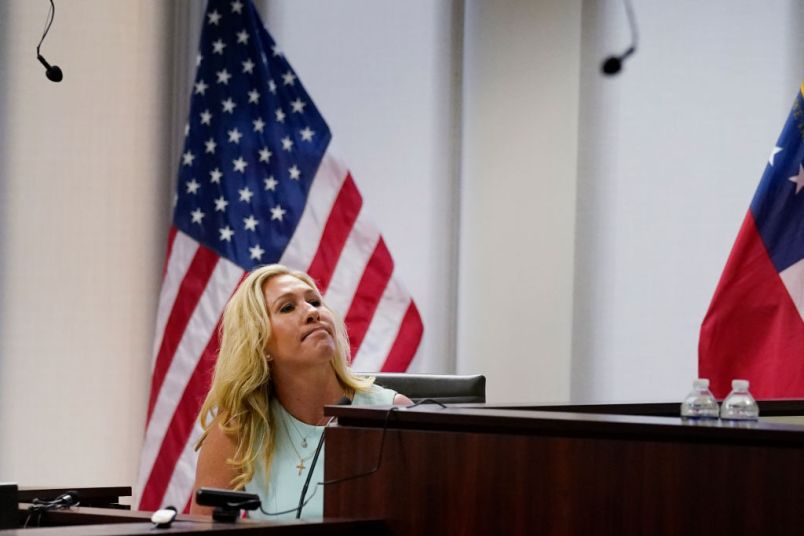Up until Friday, none of ex-President Donald Trump’s goons in Congress have had to testify under oath about the events of Jan. 6 last year, including their role in ginning up rage among Trump’s base over the 2020 election that culminated in the Capitol insurrection.
Rep. Marjorie Taylor Greene (R-GA), staring down the barrel of an effort to disqualify her from ever running for elected office again, got to be the first goon on Friday.
Greene was required to testify in front of state administrative law Judge Charles Beaudrot in Atlanta, Georgia to defend herself against a challenge to her candidacy by a group of voters in her district, who are being represented by nonprofit good governance organization Free Speech For People.
The voters are arguing that by repeatedly fueling Trump’s lies about the election and railing against a peaceful transfer of power in war-like terms, Greene had knowingly abetted the Capitol attack and thus made herself ineligible for office under Section Three of the Fourteenth Amendment, which states that anyone who “engaged in insurrection” is disqualified from serving in Congress.
After the lawyers for the voters and for Greene made their opening remarks on Friday, the GOP congresswoman took the stand, and one of Free Speech For People’s attorneys kicked off the round of questioning.
The plaintiffs laid the ground for their argument by pointing out that Greene has a well-documented history of openly endorsing violence against her political enemies on social media and in TV interviews.
Confronted with unmistakable evidence in the form of screenshots, reports and video clips of her own remarks, all Greene could really claim in her defense, for the most part, was what appeared to be a pretty serious case of amnesia.
For example, Greene doesn’t remember that time when she considered the prospect of House Speaker Nancy Pelosi’s (D-CA) execution.
The challengers’ lawyers asked the GOP congresswoman about a speech she had posted on Facebook in 2019, before she was elected. Greene claimed Pelosi was “guilty of treason,” which Greene called “a crime punishable by death.”
“I don’t recall,” Greene replied on Friday when asked if she specifically said the Democratic leader ought to be executed.
In fact, the Republican lawmaker tried to flat-out deny ever even calling Pelosi a traitor–until one of the lawyers indicated he was about to pull out the receipts:
Greene also couldn’t recall invoking “1776” as a battle cry ahead of Jan. 6, the day Congress was scheduled to certify the 2020 election results.
The plaintiffs proceeded to helpfully roll a clip of a Newsmax interview on Jan. 5 showing Greene declaring that Jan. 6 would be “our 1776 moment.”
Greene claimed on Friday that she was talking about the “courage” of the American revolutionaries of 1776, not the Revolutionary War. And also she doesn’t remember doing that Newsmax interview or sharing it with her followers.
“I don’t remember,” Greene responded when asked about the fact that the interview had been posted on her Facebook page.
The congresswoman’s memory of her conversations with MAGA folks before Jan. 6 was apparently spotty too.
For example: did she ever talk to other people, including lawmakers such as Rep. Paul Gosar (R-AZ), about there being large gatherings scheduled for that day?
“I don’t recall.”
Did she ever have a discussion with anyone about how there could be a risk of violence happening that day?
“I don’t recall.”
Did “Stop the Steal” activist Ali Alexander invite her to the pro-Trump rally he’d organized for that day?
“I don’t recall.”
The eyebrow-raising extent to which Greene claimed poor memory rather than actually denying key elements of her involvement in trying to steal the election got even more shocking when she was asked if she’d encouraged Trump to invoke martial law.
“Did you advocate to President Trump to impose martial law as a way to remain in power?” the challengers’ attorney asked Greene.
“I do not recall,” she replied.
“So you’re not denying you did it?” the lawyer pressed.
“I don’t remember,” Greene said.
It’s too early to tell how the GOP lawmaker’s testimony will affect the outcome of the challenge. After the hearing, Beaudrot will go through the facts of the case and decide whether to recommend Greene’s disqualification. He’ll present his findings to Georgia Secretary of State Brad Raffensperger (R), who’ll make the final call as to whether Greene will be included in the ballot for the state’s May 24 primary.
Raffensperger himself is running on the ballot with a massive target on his back after infuriating Trump by refusing to help him steal Georgia from Biden during the election. The secretary of state may not want to poke the MAGA bear by banning Greene, one of Trump’s most devoted followers, from office.



